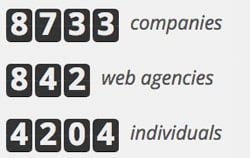People entering the freelance world are often clueless on plenty a thing; one of them, and probably the most important one, is how to actually find clients. Unfortunately, it is not uncommon for people to join the freelance community for all the wrong reasons; in Serbia, you’ll often find them freelancing (or trying to) ‘cos someone told them freelancing is the thing to do or due to general unemployment. Either way, when you choose to turn to freelancing, know that you’re entering unthreaded waters. Even those with some previous work experience in the industry, they often make a mistake when joining the freelance community.

The usual sequence of events is as follows:
- they decide to try freelancing
- they start a modern website explaining what they do
- they create profiles on social networks and start promoting
- they leave it to chance, hoping the customers will come themselves
Ok, and? Well, this is not exactly the way to go as it isn’t really productive. Even if you did get a client this way, consider it an isolated case, the exception to the rule. This doesn’t have to do much with whether you are good at what you do or not; it’s more of a “tricks of the trade” thing than anything else. Bill Bernbah, one of the founding fathers of modern advertising has long said – In this very real world, good doesn’t drive out evil. Evil doesn’t drive out good. But the energetic displaces the passive. So, take matters into your own hands!
One of the most important things for a freelancer is research. Research is crucial for a job well done, both at the beginning and later on. Truth is, “research” is just a fancy word for a rather boring activity. It does not necessarily have to be boring, though – but it usually is. If you are not sure where to start, here’s an idea. Make it your business to do a research on who the people of similar profile to yours are, and what they have been engaged lately. Then, contact people they have worked with and ask them a few questions, such as:
- How come they’ve decided to engage that particular freelancer?
- How did they find him?
- Why have they even decided to do this job?
- How come they’ve opted for a freelancer rather than a big company?
Not all of them will give you any sort of feedback, by the way. There is no malicious reason behind it, it’s simply that they don’t have neither the time nor the will. However, if you’re persistent, someone will respond eventually. Over time, you will have a more clear idea on what’s happening owing to the feedback you’ve gotten and you’ll most likely notice an interesting thing – plenty a situation will be absolutely the opposite to what you’ve been expecting. Often, what you find essential and logical, the client doesn’t.
10 Strategies For Finding Customers At The Beginning Of Practicing Freelance

At the very beginning of your freelance journey you only need a few clients. Start with your closest circle – you never know who may be needing your services. Spread the word about your freelancing engagement. That way you are expanding your base which may land you new clients. Also, focus on the problem-solving environment as this is the most productive surrounding for a beginner. When you have exhausted all levels of FFF (friends, fools and family), here are some suggestions on how to proceed:
1. Show Your Perception Of The Existing Products:
This recommendation may be especially relevant for designers, but with a little creativity you can customize it to your job. Designers often use these methods to show what they can do, to express the way they think, and of course to be noticed. Some of the examples can be seen here, here, here, and here.
2. Follow market transactions:
Always be on top of what’s new at the job market. Follow We Work Remotely, Authentic Jobs, Smashing Jobs, Elance, Krop, Guru, Freelancer and even Fiverr. In the beginning you have to keep track of everything and make sure you bid as much as possible. Remember, while doing it, don’t put yourself in the forefront but rather focus on the client’s problem. If you have no alternative, accept jobs that may be below the cost that you’d previously set as personal norm. You have to start from somewhere, remember that it takes time to gain a reputation.
Note: I introduced a rule. Each time I’m busy two months in advance, I raise prices. I did it a few times so far and it always turned out to be an absolute hit.
Don’t be lazy and invest some time and effort before sending out your offer; do a research on the client, make an offer they can’t refuse. Offer what they really need and, with just a little effort, you’ll be in a big advantage in comparison to others.

3. Use The People You Know:
In addition to addressing the immediate surroundings, start expanding your circle slowly. Spread the word about your freelancing among your acquaintances, make the most of social networks and contact your high school friends, friends from University, and all other people you communicate with who may be a good connection. To further motivate them, you can always offer a percentage of your earnings! AdriaHost motivates freelancers with 50% of the amount for the hosting for every client who host with us.
4. Talk With The Freelancers In Your Area Of Work:
Stay in touch with colleagues. You are not just competition but a community, too. Get to know them, show what you can do, suggest making a deal to take on work they don’t have the time to do, etc. We encourage you to attend events, conferences, seminars. Be in touch with the people you meet.
5. Activate Further In The Community:
Be useful part of the community. Promote yourself through helping others. Find out what hot spots are, and attend them. This way you’ll meet people you wish to attract. Each written record of your name can bring valuable contacts or business at some point. Here are a few communities in three industries:
- Designers: Designer Chat, Sidebar, Designer News, Reddit Web Design
- Programmers/IT: Hacker News Slack, Hacker News, Reddit Web Dev
- Writers/ghost-writers and copywriters: Inbound, Copyblogger forum, Scribophile

6. Create Interesting Content:
You are not a photographer if you have valuable equipment but if you do photography. In every industry there is a way to make something that others may find interesting, and perhaps useful, and thus help them improve their skills. Each complex thing you are a part of is an ideal opportunity to improve what you already know and learn something new.
- Write or show something that you believe potential clients should know about the work you do.
- If you think something the client requested is wrong, show why you think that and what you think is right.
- Share little useful tips in your area with potential customers.
- Write case studies on the work that you’re doing, or reflections on the work that you would like to do.
- Share some resources, manuals, guides, tutorials with the customer and recommend interesting online reading or a book.
7. Offer Your Services For Free:
When building your portfolio, this is an option as well. Simply, it is sometimes more important to have a little more freedom and have a good project for the portfolio than to take the money. This is also an opportunity to get yourself a good name and show the quality of your work. For instance, choose a charity, or something similar, and offer them your services. The other side should be aware of your quality, and the value you are giving them. Even though you won’t be getting paid, that doesn’t mean your time and work are worthless. If you are satisfied with the cooperation, ask them to recommend you to someone who may be interested in hiring you.
In addition, you can invest some time in a personal project. It could be devoted to a field that interests you besides the work you do, like your hobbies, for example.

8. Make A Usable Product:
Whether what you are making is pro bono or you are actually getting paid, it can bring you the necessary visibility. For starters, you can do a simple free product. If you are a writer, you can make guides with tips for writers; if you’re a designer, you can fashion a few free resources that people can use in their future work. For instance, suggest a way for an open communication between people in the designer community and those outside of it. People will hear about you, remember you, and some will definitely contact you.
9. Find A Partner:
Whatever you do, it is very likely that there is some complementary interest. Find associates that can assist you in the part of work that isn’t your profession/field of expertise and you will have a partner for the things that your clients need but aren’t something you alone can offer them. Over time and through building such a network, you will see who most convenient working with is and maybe make some permanent arrangements. It is very difficult to find good and reliable collaborators, and people tend to rely on recommendations when it comes to it. Be able to recommend and be recommended.
10. Make A List Of People And Companies That You Want To Work For/With:
It is always good to have nicely defined area of interest – niche (niche). When you find it, it is much easier to plan and explore. Once you choose a field, explore the details that come with it. Introduce yourself to potential clients, watch what they do, show them that you know their work and are interested in it. Even if they don’t hire you, they’ll have an idea of who you are. If you are not sure how to choose a niche, ask yourself two questions:
- Which industry’s products do you use and love?
- Which industry does need and engage people of your profile?
- Who are the people you would be happy to professionally socialize with and become a part of their industry?

In the end – do your homework. Always:
When you are approaching a potential client, explore his business. The area of your expertise surely has various ways to get improved, as well as your input in it. Don’t make the mistake of trying to teach them the way their business should function but rather show what you are good at and what you can contribute. Offer them something that will improve their current status, give the client a pro bono mini tutorial about something you can do, and explain it in a simple, grounded way. People get extremely happy when they are appreciated.
For example – if you’re a designer, give a concrete suggestion why something should be done and what can be done for it to be improved (e.g. shorten and simplify the registration process, organize the content in the header of the site, etc.). If you are a writer suggest new ways of content upgrade based on user experience and expectations; if you are a developer – advise them on ways they can speed up the loading site or customize it to mobile device and the like.
When you’re a freelancer, you are not just what you do. You are your own PR and marketing, and sales as well. You are like a small, but super operational company. Each of these operations has to be overcome and it will be, in time. Is this is a lot of work? Yes. But when you start as a freelancer, everything takes time, dedication and perseverance. Everyone’s story is different, but what’s shown as a common thread for all freelancers is persistence.







0 Comments